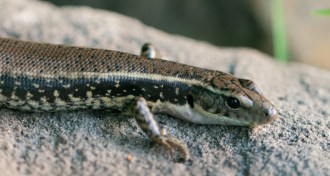All Stories
-
 Animals
AnimalsThese lizards may be able to learn from each other
An experiment with skinks provides the first evidence of social learning in lizards.
-
 Astronomy
AstronomyChemical signature of first-generation star found
The unusual balance of elements in the atmosphere of a star most likely came from the explosion of another star more than 100 times as massive as the sun.
-
 Climate
ClimateMultiple oceans may help stall global warming
The Atlantic and Southern oceans, not the Pacific, may be largely to blame for the recent pause in rising global temperatures.
By Beth Mole -
 Oceans
OceansViruses might tame some algal blooms
The rapid demise of a giant, carbon-spewing algal bloom points to the influence of viral wranglers.
-
 Animals
AnimalsHummingbirds evolved a strange taste for sugar
While other birds seem to lack the ability to taste sugar, hummingbirds detect sweetness using a repurposed sensor that normally responds to savory flavors.
-
 Astronomy
AstronomyDistance to quasars debated
Some astronomers thought quasars were buzzing around our galaxy; turns out these starlike objects live on the other side of the universe.
-
 Ecosystems
EcosystemsLake under Antarctic ice bursts with life
Abundant microbes thrive in subglacial lakes deep under the Antarctic ice sheet.
-
 Health & Medicine
Health & MedicineExperimental drugs and vaccines poised to take on Ebola
The use of experimental drugs and vaccines against Ebola may turn the tide against an outbreak in Africa that has defied efforts to control it.
By Nathan Seppa -
 Animals
AnimalsOrcas and other animals may speak with complexity
From finches to orangutans, animal vocalizations may be more complex and not as distant from the structure of human language as previously thought.
-
 Genetics
GeneticsLong before Columbus, seals brought tuberculosis to South America
Evidence from the skeletons of ancient Peruvians shows that seals may have brought tuberculosis across an ocean from Africa.
-
 Life
LifeMalaria parasite’s invasion of blood cells tweezed apart
Tugging on malaria-causing parasite cells with laser optical tweezers suggest that the parasite cells interact only weakly with red blood cells and that the interactions could be disrupted with drugs or antibodies.
-
 Anthropology
AnthropologyEarlier dates for Neandertal extinction cause a fuss
Revised dates suggest Neandertals coexisted with modern humans for several thousand years in Europe before disappearing 40,000 years ago.
By Bruce Bower